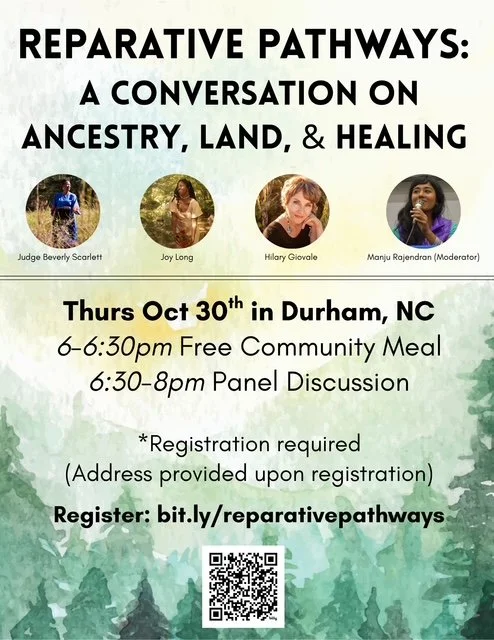
Good Relatives Series: Truth, Healing & Repair for
White Settler Ancestries
Online and In-Person, Fall 2025
About the Program
This 3-month program invites European-descended settlers in the Southeast into a journey of ancestral reconnection, healing, and repair. Through altar tending, storytelling, community dialogue, and the creation of a personal reparations plan, participants will bring ancestral insight into meaningful action, specifically around land rights issues and the U.S. Thanksgiving holiday. All proceeds from the course will be returned to local BIPOC speakers, Indigenous Memories, and 7 Directions of Service.
The series is co-anchored by author Hilary Giovale and Triangle-based organizers (see program organizing team) who are committed to white work.* Together, we will engage our lineage stories with curiosity, compassion, and a commitment to transformation—rekindling ancestral memory while practicing accountability and right relationship with land and community.
Using Giovale’s book Becoming a Good Relative as our main guide (in addition to other resources) we’ll gather for 4 online sessions, a public panel, an in-person day-long retreat in the Triangle area, and a Truthsgiving gathering hosted by 7 Directions of Service.
For questions about the program, please email: kaseyjkinsella@gmail.com
*see the forthcoming book White Work and Reparative Genealogy: Reckoning with Ancestral Debt as a Path to Racial Reparations, by Mary Watkins
Key Dates
Zoom #1 - Thursday, Sept. 11 from 7-8:30pm ET
Zoom #2 - Thursday, Oct. 9 from 7-8:30pm ET
Reparative Pathways: A Conversation on Ancestry, Land & Healing - Free Community Meal and Panel Discussion in Durham, NC - Thursday, Oct. 30 6-8pm ET (This gathering is open to the public - register HERE)
In-Person Retreat in Durham, NC - Saturday, Nov. 1
Truthsgiving hosted by 7 Directions of Service - Sunday, Nov. 2 (This gathering is open to the public - register HERE)
Zoom #3 - Thursday, Nov. 13 from 7-8:30pm ET
Zoom #4 - Thursday, Dec. 4 from 7-8:30pm ET
Why Focus on European Ancestry?
This program centers on European ancestry as a pathway to understanding settler colonialism, lineage healing, identity, and accountability. Recognizing that colonization disrupts Indigenous lifeways and severs many settlers from our own ancestral roots, this work invites reconnection. As we remember, we rebuild relationships with our ancestors, the land, and the communities around us.
Community-Based Reciprocity
This series is offered on a sliding scale of $150, $300, or $500. No one will be turned away for lack of funds - please contact us if you need financial aid. 100% of contributions will be returned to local BIPOC speakers, Indigenous Memories, and 7 Directions of Service. For transparency, we will share course financial records with registered course participants.
Payment options:
Venmo: @kaseyk
Cashapp: $kaseyjk
Paypal: @kaseykinsella
For payment questions, please email: kaseyjkinsella@gmail.com
Program
Organizing Team
-
Kasey is a 4th-generation settler of Ashkenazi and Irish descent who practices decomposing white supremacy within and around her through solidarity organizing, vulnerable conversations, and clown-comedy (her highest pleasure). She works for an environmental justice organization on Occaneechi Saponi land, supporting Indigenous-led campaigns, and co-facilitating accountability spaces for white-bodied co-conspirators.
-
Lucas loves creativity, beauty, play, earth devotion and is open to life affirming practices that unbind us from habits of relating that perpetuate harm. He is a teacher with Branches Community School, devoted to music, the Eno river and sustaining support with land, water and culturally restorative initiatives.
-
Cindy is the author of the forthcoming book, Ancestral Landscapes: Searching for My Place in the Worldin which she grapples with the complicated legacies of her white settler ancestors. Her first book, Going to School in Black and White: A Dual Memoir of Desegregation, was co-authored with LaHoma Smith Romocki. Prior to writing these two books, she worked for nearly 30 years doing reproductive health research around the world. She lives in Chapel Hill, NC, and is a mother and a grandmother. She is active in social and environmental justice work through 7 Directions of Service, Orange County Justice United, and the Farm at Penny Lane. @cindywaszakgeary
-
Hilary is a mother, writer, community organizer, and facilitator who lives on Hopi, Diné, Apache, and Havasupai land in Flagstaff, Arizona. She is a white-identified American settler whose Scottish ancestors migrated to the land now called North Carolina in the 1700s. Hilary seeks to follow Indigenous and Black leadership in support of human rights, environmental justice, and equitable futures. As an active reparationist, her work is guided by intuition, love, and relationships. She divests from whiteness and bridges divides with truth, healing, apology, and forgiveness. She is the author of the award-winning book Becoming a Good Relative: Calling White Settlers toward Truth, Healing, and Repair.





